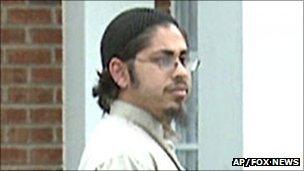Anwar al-Awlaki killing sparks US travel alert
- Published

The US-born radical Islamist cleric was killed by US drones in Yemen on Friday
The US state department has issued a travel alert to Americans, warning of a heightened risk of violence worldwide in the wake of the killing of key al-Qaeda leader Anwar al-Awlaki.
The US-born radical Islamist cleric was killed by US drones in Yemen on Friday.
The state department warned his death would provide motivation for retaliation against US interests.
Also killed was US-born propagandist Samir Khan, with unconfirmed reports a key Saudi bombmaker also died.
In issuing its worldwide travel alert, the state department said: "The death of Awlaki, in the near term, could provide motivation for anti-American attacks worldwide from individuals or groups seeking to retaliate against US citizens or interests because of this action."
It said Awlaki and other figures in his group, al-Qaeda in the Arabian Peninsula (AQAP), had previously called for attacks on US citizens.
A similar travel alert was issued after the killing of al-Qaeda leader Osama Bin Laden by US Special Forces in a raid into Pakistan in May.
Yemen criticism
Awlaki, of Yemeni descent, had been on the run in Yemen since December 2007.

Samir Khan was also said to be among the dead
The US said he had played a "significant role" in plots to blow up US airliners and had sought use poison to kill US citizens.
Mr Obama is said to have personally ordered his killing last year.
Awlaki was killed in Khashef in Jawf province, about 140km (90 miles) east of the capital, Sanaa.
Samir Khan, a US citizen of Pakistani origin, had produced an online magazine promoting al-Qaeda's ideology.
There have been reports that Saudi militant Ibrahim Hassan al-Asiri was also killed.
Associated Press news agency quoted US officials as saying intelligence had indicated he was among the dead but the officials could not confirm it.
Reuters quoted Yemeni security officials as denying Asiri had been killed.
If his death is confirmed, it would be a severe blow to al-Qaeda.
Asiri, 29, is thought to have designed explosives in two attempted attacks on the US.
One involved bombs hidden in two printers that were shipped from Yemen and intercepted in England and Dubai.
Meanwhile, Yemen's government has accused the US of disrespect in repeating its call for President Ali Abdullah Saleh to step down.
The White House said Awlaki's killing had not changed its demand that Mr Saleh, who has faced months of protests against his rule, should go.
But Yemen's Deputy Information Minister Abdu al-Janadi told Reuters news agency: "The Americans don't even respect those who cooperate with them."